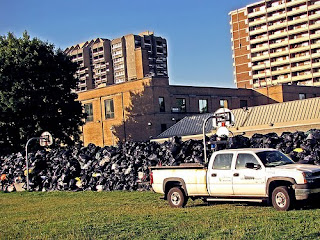
The word pica comes from the Latin word for magpie, a bird known for its large and indiscriminate appetite.
"Pica" in this case: craving and eating something that isn't nutritional -- laundry starch, or clay, or ice. Image: Royal Society for the Protection of Birds, England & Wales
Saying it Jeff Foxworthy style: "If you can list three fast-food restaurants that make "good ice," chances are you have ESRD pica."
It would be about 2 years ago I first fished a shard of ice out of a glass and started sucking on it. Not bad. Pretty soon, I was an ice-cruncher. I'd always deplored the habit in other people, and I'm sure my friends and co-workers hate it. There seems to be no way to stop.
Yes, it sounds crazy. But say you're a chocoholic and every restaurant you go into fills a 3-cup glass half full with Hershey's kisses for you for free. . . actually, that thought makes ME gag. But every cup I walk out with from Arby's or SuperAmerica is more than half-full with ice chips. It's almost become more important than the drink. Or the food.
Studies have found that from a third to two-thirds of dialysis patients -- and I'm certainly getting close to the "dialysis level" of kidney function -- may have ice pica. It seems to be a result of iron deficiency and anemia. Normal people can often kick the habit by taking iron supplements; this route won't work for me.
My "patient's theory": evolution-wise, perhaps people with anemia managed to supplement themselves -- though unwittingly -- by cracking animal bones and eating the marrow.
Whatever the underlying reason, pica's not a good idea for you or your public image. Coupled with my body's inability to absorb enough calcium, it's probably doing a real job on my tooth enamel, as well as chipping away at the patience of anyone near me.
The anemia will be resolved once I get the transplant. So will the calcium problem. And, I hope, I'll also be able to look at ice chips in a cup as an expendable perk and not a sixth food group.
www.academicjournals.org/JPC/PDF/Pdf2009/July/Stillman%2520and%2520Gonzalez.pdf+kidney+pagophagia+transplant&hl=en&gl=us&sig=AFQjCNHehBxFJXc22pFlXxE3x-7KQE4p_A
(Stillman and Gonzalez)



